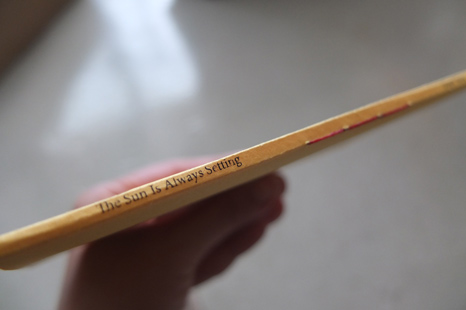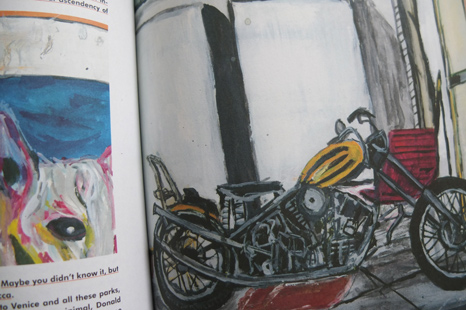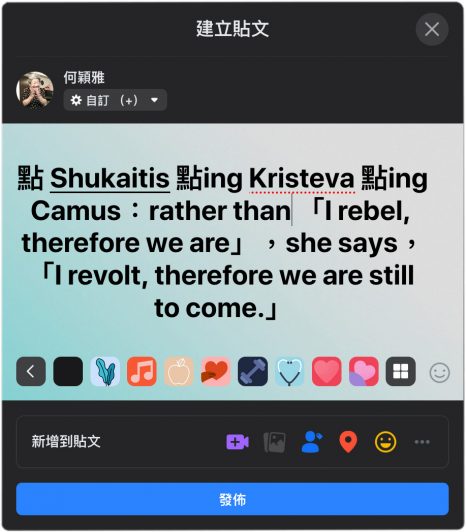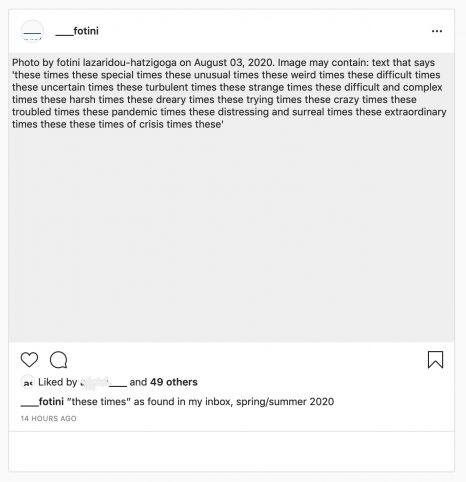dearest yous,
digital crumbs here in response to those things you said, those things you sent, real material ways and a digital means. ‘i am sorry for the delayed reply’ prefaces so many of these formations, followed mostly by the mental hesitation for apologising too much. though it’s nice to hear ‘no need to apologise’ in response sometimes, it takes a sorry to get there. truly sorry for too many things.
lateness somehow psychologically necessitated a more involved response, if this so-called ‘publicness’ can warrant any more meaningfulness. actually i told Ḅ that what i like most here is the anonymous intimacy of passerby in public, because being an outmoded place, it’s hidden in plain sight, Emily Dickinson style. there was a period when i wrote little notes and left them in random places, too, and i found one a few years ago that didn’t get distributed, so sent it to Ẳ in the post along with a bunch of other random things, but i think the clutter of it all overwhelmed her, so there was not much conversation about it afterwards. at the time, her son could just fit the quarter-sized sample jacket i made in fashion school.
so many things need explaining.
and your faith astounds me sometimes. but i guess we still make (it) work. it’s perhaps not so dissimilar——nudity in public, intimacies for those who were never keen at p.d.a., the weaning separation from one’s body that is called a work.
Art is insufficient to narrate the inhumanity of history, because it is insufficient to explain it. Disaster is either explained by means of psychology, or the savagery of society is described as if it were a supernatural event; fascism is presented ‘as the machination of rackets outside society, not as the coming-to-itself of society as such.’
-from The Orpheus Double Bind: What Can Writing Save?, Nurdan Gürbilek
and what would you say to those that don’t watch films, don’t really read books, don’t dance? aren’t they terrible, those people, how are you going to explain it to them? how are you going to wish for them the thing that changed you and you don’t regret it not one bit, except all the times you fail to explain it to your stern mother or that person in power that you wanted to impress. you’re sorry.
Åž, i like the digitised irony that your rooms reminded me of playing Hitchhiker’s Guide to the Galaxy, or growing up choosing my own adventure——though you don’t say ‘you’. but something like she says, it wasn’t birds but paper speaking——your real, material and actual post, Åž, so carefully bound by hand and sent to me across the Pacific just as you said you would, when most people don’t. and with that I have to tell you, unapologetically sorry, that I haven’t forgotten what I said I would send to you. it’s not ready yet, hopefully soon.
“Time the Great Healer (live at the Boston Museum of Fine Arts, 5 September 2006)â€, Cat Power
though today i put off work to deal with a number of personal matters. and really that is an irony as well, as if they were separate in these realms, you know what i mean, but again it’s something about still learning to explain after all this time, i have to reiterate myself and you to yous again and again, because you weren’t listening and in my anger i don’t hear myself. maybe you’ll say i have to listen more in order to be heard. maybe.
i like that the package from Ä´, one of the most dedicated in believing the romance of ‘art’ and ‘post’ all these years, came this time not directly from you but by the smooth spaces of guanxi through the editorial office of a magazine based in Spain. i like that you once fleetingly included me in one issue, and still hope that we’ll have that chance for a two-day dialogue over sidewalk beers some day.
“ピンクブッムPink Butch (ラララ Lalala)â€, マジカル・パワー・マコ Magical Power Mako
i like that an e-mail from È» seems so anachronistic amidst all of our other conversations online, that the tone differs by that very fact and that you’ve encouraged me thus to write poems in Chinese, like Ɀ also showed me, so simply, how line breaks make all the difference.
did i show you the poem he helped me to break?
æ¯ç•¶ä½ ä¸åœ¨ï¼ˆèº«é‚Šï¼‰ï¼Œæˆ‘念åŠä½ 的時候
總有許多的話,想è¦å°ä½ 說
è·é›¢æ…¢æ…¢ç¸®çŸï¼Œç©ºé–“å»è®Šå¾—
越來越厚é‡
æ–‡å—難以承載的那些話題
總與天氣有關
一種ä¸é–“狀態,它從來ä¸æ˜Žç™½ä½
或者是我
我們侃侃而談
談論愛
å»ç¸½æ˜¯ä¸å¤
— from the 視覺åšç‰©èªŒ Visual Diary Archive project “其人,其事:何京蕴 Just People, Just Timing: Anouchkaâ€
and for Ḅ, who joined us most recently and 那麼有è€å¿ƒ accompanied me 陪著我 so patiently on the å今天的山車 roller coaster of today:
Posted by 丫 | reply »
keeping it together
“What exactly do I mean, even, by ‘style’? Perhaps it is nothing but an urge, an aspiration, a clumsy access of admiration, a crush. On what? The very idea. Form and texture rescued from chaos, the precision and extravagance of it, the daring, in the end the distance, such as I think I could never attain. As much in a person, in a body, as in prose: those people who can keep it together. ‘I like your style’ means: I admire, dear human, what you have clawed back from sickness and pain and madness. I’m a fan, too much a fan, of your rising above. I overestimate your power, loved writer, beloved essayist. What is it I want from you? Not quite comforting. Consolation. Is it consolation? A model of how to survive? The worst, most painful truth spoken as eloquently – or is it as strangely – as possible. The vantage it seems to me you have acquired. Of course I admire it because it seems to take you as writer, me as your reader, closer to the truth. By indirection find direction out. And so on: other clichés of the writing life. “ The problem essentially is this: I want control, and I want to let go, but neither in itself is art, and how on earth do you find a way between, a way to direct all of this ecstasy and ache? And still not lose it? (Virginia Woolf on essays: ‘Never to be yourself and yet always – that is the problem.’) Is there some combination possible of form and the formless that would achieve what I want to achieve? Is that not merely another name for compromise?â€
From Essayism by Brian Dillon
Posted by f | reply »dopamine pathways â„–2
— from Imaginal Machines, before that Revolt, She Said, before that The Rebel
Posted by 丫 | reply »â€œthese timesâ€
these times
these special times
these unusual times
these weird times
these difficult times
these uncertain times
these turbulent times
these strange times
these difficult and complex times
these harsh times
these dreary times
these trying times
these crazy times
these troubled times
these pandemic times
these distressing and surreal times
these extraordinary times
these times of crisis
times like these
—an index of “these times†as found in my inbox, spring/summer 2020
Posted by f | more »dopamine pathways…sigh
unfortunately this is what i thought you meant by ‘post’…
Posted by 丫 | more »æ…¢éžä»¶ dispatch HQL-299
// 內容 CONTENTS //
《è–誕島,自然而然》 Memorial to the Last Christmas Island
Pipistrelle, from the series Christmas Island, Naturally by Robert ZHAO
Renhui (趙ä»è¼ä½œå“)
// 訂é‡ä¿¡æ¯ QUANTITATIVE //
åˆ†å…©ä»¶çš„ä½œå“ one artwork in two pieces
(è™è è²éŸ³æŽ¢æµ‹å™¨å’Œéº¥å…‹é¢¨ bat sonar detector and microphone)
185 x 134 x 82 cm
// 出發點 START POINT //
香港鰂éšæ¶Œ Quarry Bay, Hong Kong
// 到é”點 END POINT //
æ–°åŠ å¡ä¸å±±å…¬åœ’戴斯飯店 Days Hotel by Wyndham Singapore at
Zhongshan Park, Singapore
// æ…¢éžäººå“¡ COURIER //
易拎何å PORTABLE
 // é‹è¼¸ç‹€æ…‹ SHIPPING STATUS //
æ´¾é€æˆåŠŸ SUCCESSFULLY RECEIVED 2019-06-09,10:57
æ…¢éžæ‹›å‹Ÿç™¼å¸ƒ ROUTE REQUESTED 2019-05-29,16:41
我本來沒想記錄這æ¢ç·šï¼Œå› 為çªç„¶é–“——也是機緣巧åˆâ€”—我接了一æ¢ä»˜è²»çš„ç·šè·¯ã€‚ä½†æ˜¯åœ¨é£›æ©Ÿä¸Šæ™‚ï¼Œçœ‹åˆ°äº†ä¸€å ´ç•°å¸¸æ¼‚äº®çš„é›²ï¼Œåƒæ˜¯è¢«è•åˆ»çš„懸崖ã€ç¿»æ»¾çš„海浪ã€æ‰‹æç®±åˆæˆ–是UFO排著隊一個一個湧ç¾ï¼Œä¸€å€‹é¨Žä¼åœ¨å¦ä¸€å€‹ä¸Šé¢ã€‚我想著æ‹å¼µç…§å§ã€‚我想象著熙熙攘攘的人們åƒé›²æœµä¸€æ¨£æ“æ“ åœ¨é€™å€‹å…‰æ»‘ç„¡èŒçš„é£›æ©Ÿå ´é‡Œï¼Œé«˜é«˜çš„ã€æœ‰å¼§åº¦çš„天花æ¿ä¸‹ç„¶å¾Œï¼Œå¦ä¸€å€‹æ…¢éžå“¡èªªä»–ä¸ç¢ºå®šé€™è¶Ÿæ—…程是å¦èƒ½æ¿€ç™¼ä»»ä½•æƒ³æ³•ï¼Œå› 為乘å的是飛機而éž24å°æ™‚çš„ç«è»Šï¼›é£›æ©Ÿå ´çœŸçš„太無èŒäº†ã€‚然後,我回應他說我喜æ¡é«˜æ˜‚情緒在這種無èŒç’°å¢ƒä¸æ‰€å¸¶ä¾†çš„強烈å°æ¯”。然後,我覺得å†å¦ä¸€å€‹æ…¢éžå“¡å¤ªå¤©è 了,在表é”願æ„承接å¦ä¸€æ¢ç·šè·¯æ™‚å°ã€Œæ„›ã€é€™å€‹è©žçš„使用充滿算計。好åƒå¦‚果她ä¸æ„›æˆ‘了,那æ¢ç·šè·¯ä¹Ÿå°±çµ‚æ¢äº†ã€‚我ä¸ç¢ºå®šå› 為愛而讓一個人æ²å…¥å·¥ä½œæ˜¯å¦æ˜¯å¯æ¥çš„,åˆæˆ–者如她所言,一å†ç”¨è’å”çš„é‡åŒ–æ€ç¶è¡¡é‡äº‹ç‰©ï¼Œåæ˜ äº†æˆ‘å€‘è‡ªèº«çš„è¢«å¥´å½¹ï¼Œè€Œä¸”ä¸éŽæ˜¯æŒ‰ç…§åˆä¸€å€‹è³‡æœ¬ä¸»ç¾©é‚輯在走。å¦ä¸€å€‹æ…¢éžå“¡èªªï¼Œé€™å€‹å¤©è 座慢éžå“¡å分擅長太戀愛——就å—é¢æ„æ€ï¼Œè«‡è«–浪漫的戀愛(演講,公開發表言論,表演)。但我們å°æ„›åˆ°åº•èƒ½èªªä»€éº¼å‘¢ï¼Ÿæˆ‘覺得她談論愛的時候是在利用我,但也許我拜託她慢éžæ™‚她也åŒæ¨£è¦ºå¾—被利用。也許這就是愛的勞動⋯⋯這種愛的類型就是我們åŽæƒ¡çˆ¶æ¯æ‰€æœ‰çš„那種,哪怕鬧翻天最後還是ç¶åœ¨ä¸€èµ·ã€‚一直在一起。
這個慢éžå“¡å¦‚æ¤æ„Ÿæ…¨æ–¼å¦ä¸€å€‹æ…¢éžå“¡è¨Žè«–愛的能力,也說明她在情緒上éé‡äº†æŸç¨®å›°é “。這些話ä¸çŸ¥é“怎麼說。這也是勞動?感覺å¡ä½ï¼Œæœè…¸åˆ®è‚šï¼Œæƒ³è¦ä¸€å為快?就åƒæ˜¯æƒ…緒進入了一個無èŒçš„ç’°å¢ƒï¼Œç†™ç†™æ”˜æ”˜åœ¨èƒƒå’ŒæŽ›åœ¨ä½ å˜´å¾Œé¢çš„那個å°æ±è¥¿çš„大門之間奔波,å¯èˆªç總是一å†å»¶èª¤ã€‚é€™çœŸæ˜¯é …è‰±å·¨çš„ä»»å‹™ã€‚
我想起了一張飛機機翼指å‘雲海的照片,是一ä½æœ‹å‹åœ¨2011å¹´æ‹æ”的,當時他48æ²ï¼Œç¬¬ä¸€æ¬¡å飛機。其實他是從北京到廣州去工作,但是在雲端,他寫了一首詩。
這會兒,飛機上的空調還是一å‘冷的讓人絕望,但我們æ£æœå—飛行,太陽在我這一å´ã€‚我一直緊é 窗戶以å–暖,但我沒有æ‹é›²ã€‚
I didn’t think about documenting the route this time, mostly because I felt shame to suddenly, by chance, be carrying a route for financial gain. But then while on the airplane, an especially beautiful explosion of clouds, like ravaging cliffs and waves and suitcases and UFOs waiting in line, one after another, bulbous one on top of another. I think about taking a photograph. I think about swathes of people like clouds rushing under the tall, curving glass ceilings of sleek and sterilised airports. About how another courier said he was not sure if he would be able to come up with inspired documentation this time, travelling by plane as opposed to the 24-hour train ride of his previous route; airports are too sterile. About how I then responded that I like the contrast of such high emotions in those sterile environments. About how I felt like she was being so scorpion in her calculated use of the word love when talking about her willingness to take another route. That courier route would stop when she stopped loving me, supposedly. I was not sure if it should be shameful to engage someone to work for love, or, as she said, to run again on something absurdly quantifiable, meaning facing up to our servitude, and just simply following another capitalist logic. Another courier says that scorpion courier is very good at 談戀愛——literally, to talk about romantic attachments (and the act 演講, of talking publicly, is to perform). But what can we really talk about love? I feel like she’s using me when she talks about love, but perhaps just as she feels used that I ask her about routes. That is the labour of love, perhaps…the kind that we resent our parents for, the kind that keeps them together after all those explosions and all this time. All this time.
The courier that is impressed with another’s ability to talk about love confesses that she gets stopped by emotion. All these words that don’t know how to come out. Is that a labour, too? To be stuck with our hiccups and having to work around not knowing how to liberate difficult words? Like emotion in a sterile environment, rushing all about somewhere between a stomach and the gate of that little thing that hangs in the back of your mouth, even though the flight paths are on perpetual, repeated delay. It is a lot of work.
I think about the photograph of the wing of the aircraft pointing toward a sea of clouds, the one photographed by a friend in 2011 on his first journey by plane at the age of 48. He was on his way from Beijing to Guangzhou for work, actually. But while up in the air he wrote a poem.
The air conditioning on this plane is as usual on high for sterility, but we’re flying south, and the sun is on my side. I keep leaning close to the window to keep warm, but I don’t take a photograph of clouds.
Posted by 丫 | reply »ä½†é¡˜ç‚ºæ‚¨æ述得更好ASMR
「但願為您æ述得更好ã€ASMR——在糟糕的日å里,讓您舒æœä¸€ä¸‹
雉尾電å°ï¼Œ2018å¹´4月20日,凌晨1ï¼å…©é»ž
archived recording, originally broadcast on Pheasantail Radio, 20 April 2018, 1 – 2 am UTC +08
featuring selections from:
🎧 《A User’s Guide to Demanding the Impossible》 by the Laboratory of Insurrectionary Imagination
🎧 「Coping Mechanism: The Care of Self and the Politics of Listening in Art and the ASMR Communityã€by Ashley Lee WONG
🎧 「RECEIVE UNEXPECTED MONEY IN 1 DAY | Subliminal To Attract Moneyã€
首爾蘑è‡ç†è¨˜ Spore-adic Notes for Seoul
 Y’s drawing appeared on his leg a few weeks later…
Y’s drawing appeared on his leg a few weeks later…
Having left out the exact words i had meant to express to her, i sent the e-mail a second time: “oh, before i meant to say: ‘and despite *my fear and nervousness*…’ ” Fear and nervousness to be left out at all costs, if we are to talk about serendipity. Except that it’s a silly word. Except that we couldn’t find the right word in Korean. Because 緣份 is more than serendipity, if we are talking about circles of time, letting things be, how we got here in the first place. I will try to forget about my fear and nervousness, to find comfort in someone else’s words, like D. says—“ç†è«–很舒æœâ€ã€‚
It’s the resonance that she means here, and that is to say a——let’s call it ‘pleasant’——reverberation between the two.
(it’s funny how that’s never really so acceptable in art economies)
 from “Things That are Massively Distributed” by Alma HEIKKILÄ
from “Things That are Massively Distributed” by Alma HEIKKILÄ
Y.Y. and I.S. made an exhibition with the exact same name as our project a few months ago. I didn’t know, I really didn’t know! Clumsily avoided saying too much afterwards except the utterly boring, “I really liked your show”, and basically also delayed to read the accompanying publication, for fear of inadvertently finding too much resonance. But then one thinks they should be doing more research, the spores have already been released and——let’s take small comfort in numbers again——I.S. does write about three plus one becoming understandings of the word ‘catalogue’, so one and one and one and one…new appendages would be the point of these communiqué—let’s grow into our new eachother bodies.
(a question to you though, why does agency become automatically associated in singularities?)
 from “Catalogue Essay” by Isabelle Sully, Catalogue (Publication Studio Rotterdam, 2018)
from “Catalogue Essay” by Isabelle Sully, Catalogue (Publication Studio Rotterdam, 2018)
And then at the cusp of their heat wave, the one that makes a girl conditioned to heat and sweat giggle, other Girls Like Us picked up the same networks of drifting mycellium, and they deconstructed the magazine in another magasin, taking off and piling up, cushions and colours and all forms of care…

from the Girls Like Us workshop; A School, A Park 2018
We keep talking about things that spread and circulate. People, goods, ideas, memes, mycelia. All that fussing about, when actually the question of survival, of making a home (outdated concept?) is a very concentrated, tiny little thing. Like focusing upon words across lines, line to line, and all the networks in the world following through to that little nub at the end of a serif font. And of course it’s no end, Borges, the sentences continue, and your train of thought goes somewhere else. I’ve misunderstood you.

Dear Anna,
Today we had a very nice discussion centring around your book with our collaborators from Read-in and Kunci, and together we came up with a few questions to ask you:

M. has mentioned several times about needing to find out again the name of the Japanese scholar who talked about our Asian spinelessness. In Eastern ontology of print there was no spine. The book was a scroll. Does the spine allude to a ‘Western rigidity’ and an obsession with structure and order? “We have no spine but that will be something that we’ll talk about.”
(but to have the courage to talk about it, i’ll have to forget my fear and nervousness)
To mention in speech what somebody else has said is perhaps a way of ‘owning it’. Or what are the footnotes of speech? Can the simultaneity of attributions be translated in real-time, like ASMR tingles and little cartoon devils on shoulders? And what if you are the one who is really terrible at telling stories, at making the punchline of the joke work? No, I think I’m funnier in Chinese.
But what I really wanted to tell you about is something that has half-slipped my memory for at least ten years now, though the other half of it keeps coming up every now and again, like those waves of text while walking.
I read you here and I read you there, here and there, like a spore trapped in my memory because I will always remember the fuzz of something in the vicinity of you on the page. At the same time I know exactly where you are, left or right, a third of the way down…everything else in darkness as we rode a night bus through a foreign country.
— from the COVER; Hong Kong, Shenzhen and Guangzhou, Display Distribute『CATALOGUEã€No. 3, co-edited with Kunci and Read-in
This one was somewhere about three-quarters of the way down, on some days it’s on the left side of the page, on others it’s the right. He talks about the linguistic typology of words that become true by virtue of their utterance——what are they called? In conjunction with this writing, I tried——as I do every once in a while when I want to ‘own it’, to track it down again. Weird keyword searches, scanning the possible PDFs. Tonight I realised that I must have lost the hard copy of that beloved book, the one that I think it’s in. But then I found only one sentence from the entire PDF version highlighted: “For human beings who have lost every sense of naturalness, each single gesture becomes a destiny.”
I won’t tell you who this comes from so that you’ll feel the same haziness as I do,
(remember my place on the page)
as if I was telling it to you in casual conversation while we are waiting together for something. Let’s own it. But anyway, it’s not the term ‘speech acts’. Though I saw that exhibition as well. If we should talk about our being-in-language, utterances to representation, yes, then my fear and nervousness comes back, a whole life gone by…destiny. and it circles back to 緣份. it must be circular, it must be circular, I say to myself. Not so grandiose as a speech act, but as small and tiny a little thing, like, “sigh…”
____________







